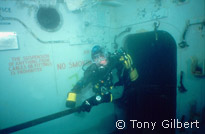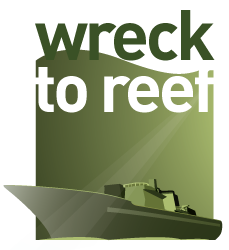Overview
Weymouth and Portland Wreck to Reef is the non-profit community group behind the push to obtain permissions to source and to sink a ship as an artificial reef at a location to the east of Weymouth and Portland.
The general National decline within the diving industry has been exacerbated in Weymouth and Portland by three things, the sinking of HMS Scylla in Plymouth, the building of an accessible launching facility in West-Bay at Bridport, and a ban on diving the HMS Hood in Portland Harbour, this for safety reasons.
Drawing on the experiences and the resulting benefits of previous man made artificial reefs, notably in Plymouth but also around the world, it is believed that this project will help redress the economic down-turn within our diving industry.
Worldwide
Man made artificial reefs are not a new thing by any means. The Japanese have been building them for over four hundred years to improve their fish stocks. They’re determined they won’t run out of sushi. Canada, America and Australia, have been sinking ships as diver and angling attractions for up to thirty years or more. Brazil is currently manufacturing concrete reef balls which have pioneered reef restoration throughout the world. In India villagers make triangular concrete structures utilising the very sand from their beaches, then they sink them to redress the damage done by commercial trawling.
The list goes on.
In fact, only a few miles from where we are today, a reef is being constructed by a New Zealand company to facilitate wave formation for surfers. This is happening now, off Bournemouth beach in Dorset, UK
Even closer to us in Poole Bay, Dr Ken Collins of Southampton University has been monitoring an artificial reef that he had constructed back in the eighties, and if any of you had been to one of his fascinating lectures on this subject you would have seen the resounding success of the increase in marine life in what was previously a relatively barren area. The upshot is that artificial reefs work for whatever is asked of them.
There has been much academic research done on this subject worldwide, including Southampton University and all this is well documented. By and large, this research shows that provided the obstacles used for artificial reefs are environmentally clean, and are heavy enough not to migrate from where they are placed, then the biodiversity of that area will increase dramatically.
Ethos
But we don’t want to profess to you that we are doing this solely for the environment. That would be wrong, and we are not. Economics is the driving force behind this. The diving industry in Weymouth and Portland is a shadow of its former self. For instance, in 2003 there were twenty four dive charter boats operating out of the area and now there are less than half that number.
However, having said that, marine life will still flourish on an artificial reef no matter what the politics.
And talking of politics, we are under no elusions as to how difficult it will be to secure all the necessary permissions. There will be the Crown Estates to deal with, the MCA, Southern Sea Fisheries, English Nature and a host of other organisations. This fragmentation tempts us to suggest on a broader note that artificial reefs could be used as an integrated management tool within the European Coastal Zone or at least within the C-scope project. This would have the effect of streamlining and encouraging the whole business, and all this before persuading the MOD to part with a ship, let alone finding funding for the project; but it’s been done before, it can be done again.
Support
Already we have received practical support and enthusiasm from Weymouth and Portland Borough Council.
Gary Fooks the 2012 Olympic Legacy Director is including the project as part of just that, the Olympic Legacy so that a world class dive venue can run alongside a world class sailing venue. The Portland Partnership and Portland Gas Ltd is working with us and will allow us to install a viewing system between the proposed reef and an interpretation centre on Portland and elsewhere. Southampton University, a world leader in artificial reef research, will become involved in our environmental impact studies.
Final Thought
Just a thought to leave you with, Japan has artificial reefs covering some twelvepercent of its coast. It sees its artificial reef program as so economically important, that its annual reef budget is equal to our annual military budget.

